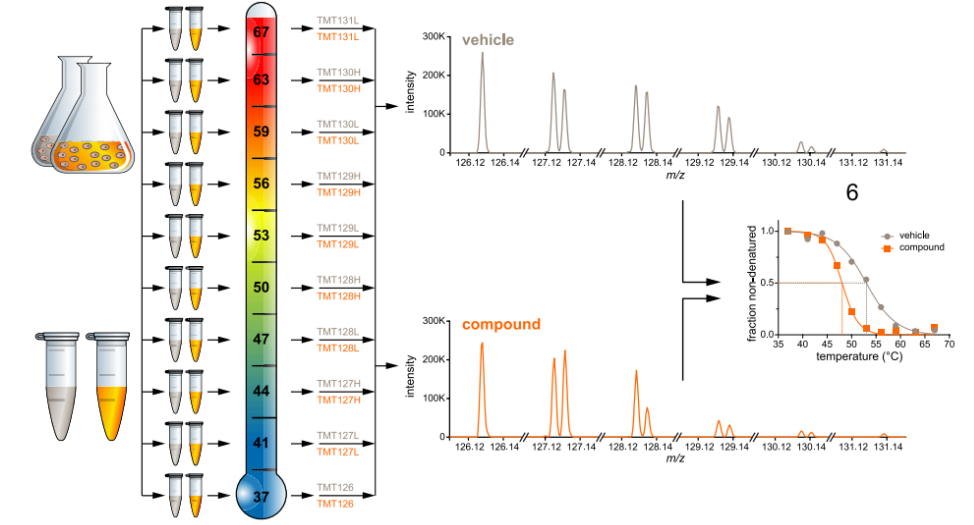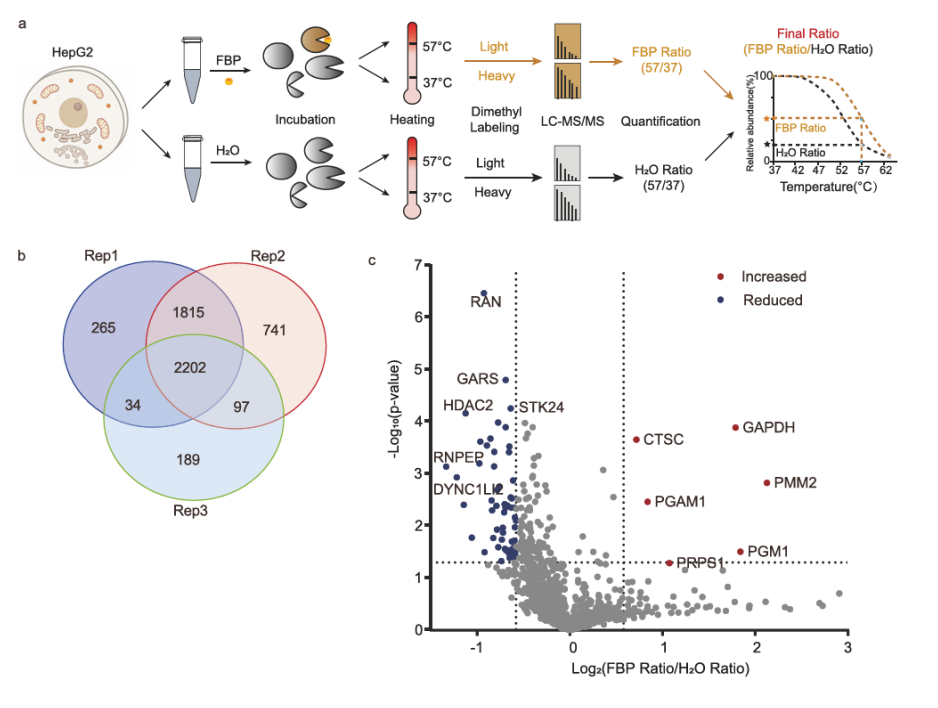Target Identification for Drug Discovery Service
Target identification for drug discovery focuses on studying the molecular targets of small-molecule drugs. Small molecules, typically defined as compounds with a molecular weight of less than 900 Daltons (Da), can be categorized into endogenous and exogenous molecules based on their source. In drug discovery, target identification analysis is primarily directed at investigating the potential protein targets of exogenous small molecules within biological systems.Various advanced approaches have been developed to explore these interactions, leveraging chemical small molecules that can specifically react or interact with target proteins. These methods enable systematic investigation at the molecular level, revealing the functions of specific proteins and their interactions with small molecules. This facilitates the identification of potential targets for small-molecule drugs. Target identification for drug discovery service can enable high-throughput, precise identification and development of novel drug targets, as well as downstream target validation, accelerating the drug discovery process.

Savitski, MM. et al. Science, 2014.
Figure 1. TMT-Based Thermal Proteomics (TPP) Workflow.
Services at MtoZ Biolabs
MtoZ Biolabs provides a variety of target identification for drug discovery service combined with experimental methods of LC-MS/MS coupled with TMT labeling or DIA acquisition mode. Through rigorous experimental design, precise protein quantification, and advanced bioinformatics analysis, we identify differential protein changes between small molecule-treated and control samples to uncover potential targets. Our services encompass the following core approaches:
1. Thermal Proteome Profiling (TPP) Services
Thermal Proteome Profiling (TPP) determines the stability of the proteome by measuring the solubility of proteins in cells or cell lysates at varying temperatures. Protein thermal stability can change when interacting with small molecules such as drugs or metabolites, nucleic acids, other proteins, or during post-translational modifications (PTMs). TPP identifies target proteins by assessing the thermal stability differences between ligand-bound and ligand-free states. Applications include identifying drug targets and off-targets, investigating protein-metabolite and protein-protein interactions, studying the effects of PTMs on protein stability, and exploring protein functions and metabolic pathways. A key advantage of TPP is its ability to reflect the native binding state without additional modifications, providing information on both direct and indirect targets.
2. Drug Affinity Responsive Target Stability (DARTS) Services
In their native state, proteins adopt highly folded three-dimensional structures, with varying folding patterns across different regions. This variation affects the solvent exposure of amino acid residues, leading to differential protease susceptibility. For instance, disordered regions with higher flexibility are more prone to protease cleavage. When small molecule natural products bind to target proteins, they may hinder protease access to cleavage sites on the target protein, resulting in incomplete digestion. Based on this principle, the binding of a drug to a target protein can confer protease resistance to the target, which can be utilized for screening small molecule-protein interactions. This method is commonly known as DARTS (Drug Affinity Responsive Target Stability).
3. Limited Proteolysis-Mass Spectrometry (LiP-MS) Services
Limited proteolysis-mass spectrometry (LiP-MS) is a method designed for large-scale detection of protein structural changes. This technique combines proteomics and mass spectrometry to identify protein structural alterations directly within complex biological contexts. Under native conformational conditions, proteins are digested using a non-specific protease. When proteins undergo conformational changes, such as binding to small molecules, different protease cleavage sites become exposed, leading to the generation of distinct proteolytic fragments. Subsequently, trypsin is used for secondary digestion. Mass spectrometry is then employed to compare the signal intensity of fully digested and partially digested peptides (LiP-digested peptides) under different treatment conditions, enabling the analysis of protein conformational changes. This method is applicable for identifying induced protein structural alterations, drug target identification, detecting disease-associated protein structural states, and directly analyzing protein aggregates in biological samples.
Based on Thermo's TMT labeling reagents, Orbitrap, and Astral series mass spectrometers, combined with the Nano-LC system, MtoZ Biolabs provides target identification for drug discovery service such as TPP, DARTS and LIP-MS, which can ensure high precision and high sensitivity of data acquisition.
Service Advantages
1. Advanced Analytical Platform
MtoZ Biolabs has established advanced target identification for drug discovery service platform, ensuring reliable, fast and high-precision analysis services.
2. Transparent Pricing
Our pricing structure is transparent, with no hidden fees or additional fees.
3. High Data Quality
Deep data coverage and strict data quality control. The bioinformatics platform integrates all target identification analysis data in drug discovery and provides customers with comprehensive data quality control, differential analysis and functional analysis data reports.
4. Customized Research Solutions
MtoZ Biolabs can provide you with customized services to solve your unique research questions and experimental requirements.
Sample Submission Suggestions
1. Sample Types
We accept cell and tissue samples. For solid samples, transportation with ice packs is sufficient. For liquid samples, they can be vacuum-dried or freeze-dried and transported with ice packs, or alternatively, shipped on dry ice. We ensure proper preservation of samples to maintain protein integrity and ensure accurate quantification results.
2. Sample Amount
It is recommended to prepare more than 3 biological replicates.
Note: For special requirements or assistance with sample preparation, please contact us.
Applications
1. Discovery and Validation of Disease Biomarkers
In research on cancer, cardiovascular diseases, neurodegenerative disorders, and more, TPP enables the quantification of specific proteins, serving as biomarkers for disease diagnosis, prognosis, or treatment.
2. Drug Development
Target identification for drug discovery service can be used to analyze drug mechanisms of action, drug-target interactions, and conduct pharmacodynamics/pharmacokinetics studies.
3. Drug Target Identification
LiP-MS can identify direct protein targets of drugs, providing valuable insights for drug repurposing and new drug development.
4. Drug Screening and Optimization
During drug development, these services can screen and optimize compounds with specific activities, enhancing the efficiency of drug design.
Case Study
1. Revealing the Molecular Mechanism of FBP as a Phosphate Donor Activating PGAM1 Using Thermal Proteome Profiling
This study employed thermal proteome profiling (TPP) to comprehensively analyze the fructose-1,6-bisphosphate (FBP)-interacting proteome in the HepG2 hepatocellular carcinoma cell line. Researchers discovered that FBP acts as a chemical signaling molecule, serving as a phosphate donor to activate phosphoglycerate mutase 1 (PGAM1), thereby providing feedback regulation for glycolysis and cell proliferation. FBP directly activates PGAM1 via histidine phosphorylation, promoting glycolysis and cell growth, supplying energy and biomass for tumor development. PGAM1 analogs such as 1-DMeFBP were identified as potential tools for developing novel anticancer drugs by targeting glucose metabolism to inhibit tumor growth.

Zhang, Y. et al. Nat Commun, 2024.
Figure 3. TPP Method Reveals the Molecular Mechanism of FBP Activating PGAM1.
Deliverables
1. Comprehensive Experimental Details
2. Materials, Instruments, and Methods
3. Total Ion Chromatogram & Quality Control Assessment
4. Data Analysis, Preprocessing, and Estimation
5. Bioinformatics Analysis
6. Raw Data Files
MtoZ Biolabs, an integrated Chromatography and Mass Spectrometry (MS) Services Provider, provides advanced proteomics, metabolomics, and biopharmaceutical analysis services to researchers in biochemistry, biotechnology, and biopharmaceutical fields. Our ultimate aim is to provide more rapid, high-throughput, and cost-effective analysis, with exceptional data quality and minimal sample consumption. Free project evaluation, welcome to learn more details!
How to order?







